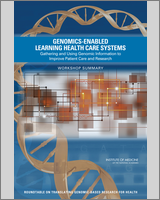NCBI Bookshelf. A service of the National Library of Medicine, National Institutes of Health.
The inclusion of genomic data in a knowledge-generating health care system infrastructure is one promising way to harness the full potential of that information to provide better patient care. In such a system, clinical practice and research influence each other with the goal of improving the efficiency and effectiveness of disease prevention, diagnosis, and treatment. To examine pragmatic approaches to incorporating genomics in learning health care systems, the Institute of Medicine Roundtable on Translating Genomic-Based Research for Health hosted a workshop which convened a variety of stakeholder groups, including commercial developers, health information technology professionals, clinical providers, academic researchers, patient groups, and government and health system representatives, to present their perspectives and participate in discussions on maximizing the value that can be obtained from genomic information. The workshop examined how a variety of systems are capturing and making use of genomic data to generate knowledge for advancing health care in the 21st century. It also sought to evaluate the challenges, opportunities, and best practices for capturing or using genomic information in knowledge-generating health care systems. Genomics-Enabled Learning Health Care Systems summarizes the presentations and discussion of the workshop.
Contents
- THE NATIONAL ACADEMIES
- PLANNING COMMITTEE
- ROUNDTABLE ON TRANSLATING GENOMIC-BASED RESEARCH FOR HEALTH
- Reviewers
- Acknowledgments
- Abbreviations and Acronyms
- 1. Introduction and Themes of the Workshop
- 2. Advancing Patient Care and Research with Genomic Information
- 3. Translation of Genomics for Patient Care and Research
- 4. Genomics and the EHR in a Learning Health Care System
- 5. Representing Genomic Information in the EHR Ecosystem
- 6. Possible Next Steps
- References
- APPENDIXES
Rapporteurs: Sarah H. Beachy, Steve Olson, and Adam C. Berger.
This project was supported by contracts between the National Academy of Sciences and the American Academy of Nursing (unnumbered contract); American College of Medical Genetics and Genomics (unnumbered contract); American Heart Association (unnumbered contract); American Medical Association (unnumbered contract); American Society of Human Genetics (unnumbered contract); Association for Molecular Pathology (unnumbered contract); Biogen Idec (unnumbered contract); Blue Cross and Blue Shield Association (unnumbered contract); College of American Pathologists (unnumbered contract); Department of Veterans Affairs (Contract No. VA240-14-C-0037); Eli Lilly and Company (unnumbered contract); Genetic Alliance (unnumbered contract); Health Resources and Services Administration (Contract No. HHSH250200976014I, Order No. HHSH25034021T); International Society for Cardiovascular Translational Research (unnumbered contract); Janssen Research & Development, LLC (unnumbered contract); Kaiser Permanente Program Offices Community Benefit II at the East Bay Community Foundation (Contract No. 20121257); Merck & Co., Inc. (Contract No. CMO-140505-000393); National Cancer Institute (Contract No. HHSN263201200074I, TO#5); National Human Genome Research Institute (Contract No. HHSN263201200074I, TO#5); National Institute of Mental Health (Contract No. HHSN263201200074I, TO#5); National Institute of Nursing Research (Contract No. HHSN263201200074I, TO#5); National Institute on Aging (Contract No. HHSN263201200074I, TO#5); National Society of Genetic Counselors (unnumbered contract); Northrop Grumman Health IT (unnumbered contract); Pfizer Inc. (unnumbered contract); and PhRMA (unnumbered contract). The views presented in this publication do not necessarily reflect the views of the organizations or agencies that provided support for the activity.
Suggested citation:
IOM (Institute of Medicine). 2015. Genomics-enabled learning health care systems: Gathering and using genomic information to improve patient care and research: Workshop summary. Washington, DC: The National Academies Press.
NOTICE: The workshop that is the subject of this workshop summary was approved by the Governing Board of the National Research Council, whose members are drawn from the councils of the National Academy of Sciences, the National Academy of Engineering, and the Institute of Medicine.
- NLM CatalogRelated NLM Catalog Entries
- Review Improving Genetics Education in Graduate and Continuing Health Professional Education: Workshop Summary[ 2015]Review Improving Genetics Education in Graduate and Continuing Health Professional Education: Workshop SummaryRoundtable on Translating Genomic-Based Research for Health, Board on Health Sciences Policy, Institute of Medicine. 2015 Mar 9
- Challenges and Opportunities for Genomics Education: Insights from an Institute of Medicine Roundtable Activity.[J Contin Educ Health Prof. 2016]Challenges and Opportunities for Genomics Education: Insights from an Institute of Medicine Roundtable Activity.Dougherty MJ, Wicklund C, Johansen Taber KA. J Contin Educ Health Prof. 2016 Winter; 36(1):82-5.
- Review Implementing and Evaluating Genomic Screening Programs in Health Care Systems: Proceedings of a Workshop[ 2018]Review Implementing and Evaluating Genomic Screening Programs in Health Care Systems: Proceedings of a WorkshopNational Academies of Sciences, Engineering, and Medicine, Health and Medicine Division, Board on Health Sciences Policy, Roundtable on Genomics and Precision Health. 2018 Mar 16
- Review Understanding Disparities in Access to Genomic Medicine: Proceedings of a Workshop[ 2018]Review Understanding Disparities in Access to Genomic Medicine: Proceedings of a WorkshopNational Academies of Sciences, Engineering, and Medicine, Health and Medicine Division, Board on Health Sciences Policy, Roundtable on Genomics and Precision Health. 2018 Nov 14
- Review Integrating Large-Scale Genomic Information into Clinical Practice: Workshop Summary[ 2012]Review Integrating Large-Scale Genomic Information into Clinical Practice: Workshop SummaryInstitute of Medicine (US). 2012
- Genomics-Enabled Learning Health Care SystemsGenomics-Enabled Learning Health Care Systems
Your browsing activity is empty.
Activity recording is turned off.
See more...
